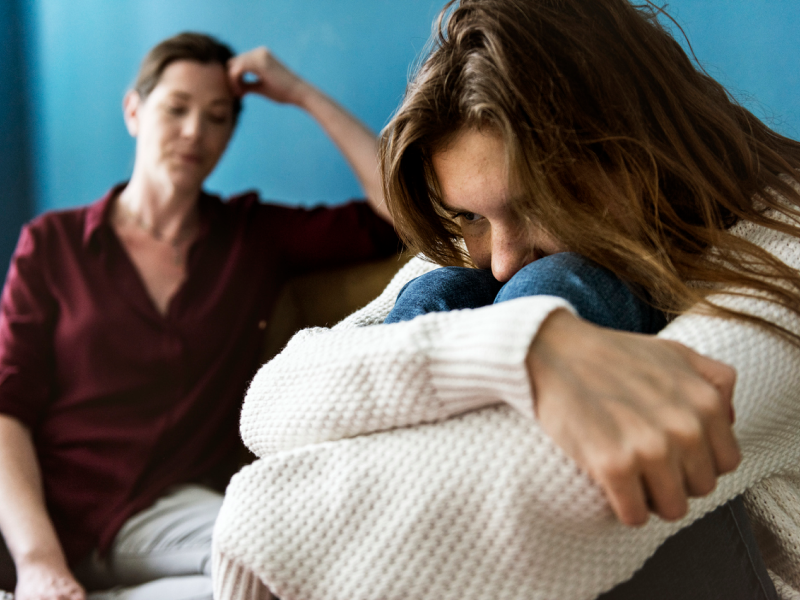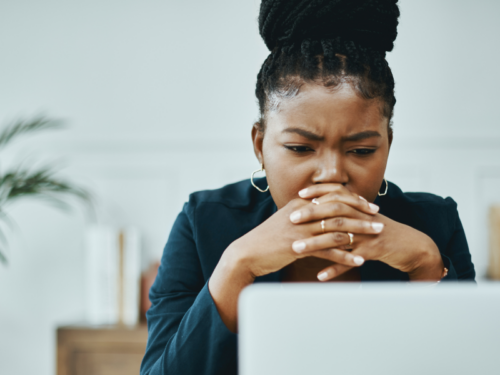
Table of Contents
What Is Treatment-Resistant Anxiety?

Written By: Ashley Laderer

Clinically Reviewed By: Dr. Don Gasparini
June 23, 2023
8 min.
Some people with anxiety may struggle to see results from initial treatments and continue to suffer from symptoms –– but help at Charlie Health is available for these individuals to feel better.
Learn more about our Clinical Review Process
Table of Contents
Do you constantly feel overwhelmed by anxiety, or do you know somebody who is? Anxiety disorders are some of the most prevalent mental health concerns in the world, affecting over 300 million people across the globe. About 58 million of those people are kids and teens.
Some individuals with anxiety disorders find relatively quick relief through therapy, lifestyle changes, and sometimes psychiatric medications –– but recovery can feel more out of reach for people who don’t respond to initial treatments. Enter: Treatment-resistant anxiety.
Here’s what you need to know about this type of anxiety and how we treat it at Charlie Health.
What is treatment-resistant anxiety?
Generally speaking, treatment-resistant anxiety occurs when an individual experiences significant anxiety disorder symptoms even after trying at least one first-line psychiatric medication, such an antidepressant, and psychological treatment (therapy) for at least eight weeks.
Many people with treatment-resistant anxiety struggle with generalized anxiety disorder (GAD). However, there are various types of anxiety disorders and anyone with an anxiety diagnosis can show treatment resistance. Other anxiety disorders include:
- Obsessive-compulsive disorder (OCD)
- Panic disorder
- Phobias
- Separation anxiety disorder
- Social phobia, AKA social anxiety disorder
Treatment-resistant anxiety is relatively common. Some research indicates that 33% of people with anxiety are treatment-resistant patients. Other research has estimated that 50% to 60% of anxiety patients still suffer from symptoms even after first-line treatments. For these people, additional treatment is needed –– either through different types of therapy, more intensive therapy, different medication, or a combination of all of the above.
It’s important to remember that the label of treatment-resistant anxiety doesn’t mean it’s impossible for someone to feel better and reduce the severity of their anxiety. It just means that the person hasn’t experienced sufficient relief from whatever treatments they’ve tried so far.
Overcoming treatment-resistant anxiety will require being open to trying new types of treatments and working closely with mental health professionals while they figure out what works best—a process that therapists at Charlie Health are trained to address.
What are the potential causes of treatment-resistant anxiety?
Causes for treatment resistant anxiety vary from person to person. However, some potential factors –– both external and internal –– that could contribute to treatment resistance include:
- Substance use
Using substances or drinking alcohol can potentially worsen mental health and negatively affect anxiety. People with anxiety may not realize that their substance use contributes to or worsens their symptoms. For example, alcohol may cause rebound anxiety after drinking. Additionally, cannabis can cause or worsen anxiety for some people, too. Even caffeine, not typically viewed as a “drug,” can worsen anxiety and prevent someone from feeling better. - Sleep deprivation
Getting enough good quality sleep is crucial for mental and physical well-being. Sleep deprivation can worsen the symptoms of mental health disorders, including anxiety disorders. So if someone with an anxiety disorder is sleep deprived, it can make it much harder for them to manage their anxiety and feel relief from their symptoms. - Co-occurring mental health conditions
It’s common for people to deal with more than one mental health struggle at a time. For example, someone with treatment-resistant anxiety may also have major depressive disorder or bipolar disorder. Managing multiple conditions simultaneously can be a bit more complex, making it more challenging to reach total symptom relief. - Genetics
Genetics and biological factors often play a role in mental health conditions and could affect whether someone experiences treatment resistance. Research has found that some genes may indicate or predict how well a particular medication, such as an antidepressant, will work for an individual. - Life circumstances
Research has found that people who deal with certain stressful, traumatic life events, lack solid social support, or face financial hardships are more likely to experience treatment resistance.
Another phenomenon that can contribute to treatment-resistant anxiety is “pseudo-resistance,” which occurs when treatment is incorrect or inadequate. Examples of this are:
- Incorrect initial diagnosis: It is possible for a mental health professional to diagnose someone with an anxiety disorder incorrectly. There are overlapping symptoms between anxiety and other disorders –– including both mental and physical health conditions. If patients receive the wrong diagnosis and the course of treatment isn’t correct, this can result in treatment failure.
- Inadequate treatment: In some cases, the treatment someone received may not have been enough. This could happen in cases where the provider was not thoroughly qualified to treat someone with an anxiety disorder –– for example, if a primary care provider simply prescribed a patient a short course of a standard antidepressant without a longer-term plan or ongoing therapy. Other instances include if someone didn’t stay in therapy for long enough to see noticeable results, or if they didn’t continue the course of medication for long enough to experience a reduction in anxiety symptoms.
It’s important to always be honest with mental health providers about all psychiatric symptoms, medications, substance use, and lifestyle habits so that they can best determine what may be causing treatment resistance and, of course, how they can help to the best of their ability.
Join the Charlie Health Library
Get mental health updates, research, insights, and resources directly to your inbox.
You can unsubscribe anytime.
How is treatment-resistant anxiety treated at Charlie Health?
Thankfully, there are many different approaches to addressing treatment-resistant anxiety. Evidence-based, effective treatment modalities offered by Charlie Health allow people to learn new ways to manage anxiety.
A combination of different approaches may be particularly helpful in cases of treatment-resistant anxiety. Three of the top methods used to help people with treatment-resistant anxiety at Charlie Health are:
Cognitive behavioral therapy (CBT)
CBT is a commonly used treatment for all anxiety disorders. This therapy can help individuals identify and restructure negative thought patterns, which therapists may call cognitive distortions. Examples of cognitive distortions are catastrophizing, where you’re focusing on worst-case scenarios rather than what could go right, or polarized thinking, when you see things in an all-or-nothing or black-and-white way.
On top of identifying and restructuring unhealthy, unhelpful thought patterns and behaviors, CBT will also teach individuals effective coping strategies, such as grounding methods and mindfulness techniques. These are useful during times of high stress or even during highly uncomfortable panic attacks.
Overall, CBT assists in addressing negative core beliefs, coping with stress, working with difficult emotions, and reducing general anxiety symptoms. CBT often involves “homework,” and it's very important for people with treatment-resistant anxiety to truly put in the work in and out of sessions for the best results.
At Charlie Health, our Care Team utilizes CBT in supported groups, individual therapy, and family therapy. CBT is a cornerstone of our treatment approach because of its efficacy in helping people recognize and shift the patterns that are holding them back from healing. CBT can help patients with a variety of mental health conditions, including treatment resistant anxiety.
Dialectical behavior therapy (DBT) skills
DBT incorporates various helpful techniques in both individual and group settings. This type of therapy has four main components, including:
- Mindfulness: This helps individuals develop an awareness of the present moment and acceptance, allowing them to observe and detach from anxious thoughts and sensations without judgment.
- Emotional regulation: This skill allows people to effectively identify and regulate intense emotions, reducing the impact of distressing emotions on stress and anxiety levels.
- Distress tolerance: DBT teaches special tools and techniques to navigate tough situations in a healthy way, rather than turning to unhealthy coping mechanisms like self-harm. These skills can help in times of both emotional and physical distress. Some examples are paced breathing, muscle relaxation, and radical acceptance.
- Interpersonal effectiveness: This helps people understand their needs and communicate with others, which can improve relationships and the overall support system.
By combining these four core components, DBT provides individuals with a useful skill set to navigate their anxiety, emotions, and relationships.
Patients at Charlie Health initially delve into DBT skills during individual therapy, where they have a chance to process personal issues and triggers and learn how to process them one-on-one. Supported groups give Charlie Health clients a chance to practice their DBT skills in a safe environment by applying them to relationship-building and communication with similar peers.
Mindfulness
Mindfulness is a tool that can make a huge difference for those with anxiety. As previously mentioned, it may be woven into CBT and DBT. Anxiety causes people to get easily carried away by their thoughts or uncomfortable physical sensations. Mindfulness helps people stay present, allowing them to sit with their thoughts and feelings and let them pass without judgment. Most people associate mindfulness with meditation. While this is a common way to practice mindfulness, there are plenty of other ways to incorporate mindfulness into daily life. At Charlie Health, mindfulness techniques such as guided imagery and breathword are taught during individual therapy, experiential groups, and creative arts group sessions.
When it comes to treatment-resistant anxiety, mindfulness helps people learn to observe their anxiety without becoming overwhelmed or caught up in the vicious cycle of anxious thoughts. By creating a little distance and recognizing that all thoughts and emotions come and go, people can feel detached from their anxiety.
Additionally, practicing mindfulness can help build self-compassion and acceptance –– both of which can be very helpful for those dealing with treatment-resistant anxiety. By learning to be non-judgemental and kinder to oneself, anxiety sufferers can feel some relief as they go through treatment. Mindfulness skills can be applied to all aspects of life, not just anxiety.
Some other benefits of mindfulness and meditation include:
- Reducing stress
- Gaining self-awareness
- Improving patience
- Increasing clarity and focus
- Showing more compassion for other people as well as yourself
- Managing cravings or urges
- Lowering blood pressure and resting heart rate

How can Charlie Health’s IOP help treatment-resistant anxiety?
IOP stands for intensive outpatient program. While many people attend therapy sessions weekly, sometimes once a week is not enough for those struggling with more severe mental health conditions symptoms, including treatment-resistant anxiety.
Charlie Health’s IOP offers more structured and intensive programming conducted multiple times a week. This is perfect for people who need more support than traditional once-weekly outpatient therapy but don’t necessarily need the 24/7 care that inpatient programs provide.
IOPs include various types of therapy. At Charlie Health people will have individual therapy, supported groups, and even family therapy. Different therapy modalities are used throughout the individual sessions and group sessions.
While in Charlie Health’s IOP, individuals can get the intensive treatment they need to address their mental health struggles while continuing with their daily life, whether that’s school or work.
On top of offering CBT, DBT skills, and mindfulness, Charlie Health’s IOP also provides the following types of therapy that may be intertwined in a treatment plan for patients with treatment-resistant anxiety:
- Art and music therapy
- Attachment-based family therapy
- Compassion-focused therapy (CFT)
- Dance and movement therapy
- Drama therapy
- Experiential therapy
- Exposure therapy
- Family support groups
- Motivational interviewing
- Relational therapy
How Charlie Health can help
If you or someone you love suffers from treatment-resistant anxiety, Charlie Health may be able to help.
Our virtual intensive outpatient program provides personalized mental health services for teens, young adults, and families dealing with various struggles, including treatment-resistant anxiety and co-occurring mental health conditions.
At Charlie Health, every client is matched with a therapist who fits their specific needs and a group of peers from similar backgrounds with similar struggles.
Coping with treatment-resistant anxiety can be difficult, but there is hope.
Contact Charlie Health to learn more today.





